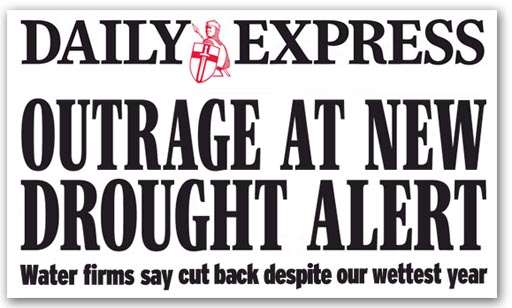Possibly the most strident is the Daily Express, which devotes its front page to the "outrage" caused by commercial companies which, over the last ten years have doubled their prices yet, after a record supply of the raw product, are now enjoining their customers to use less of their product (without any discount for so doing, of course).
And although water companies admit their reserves are healthy, they do not rule out restrictions this year. A spokesman for Thames Water – typical of the breed - says: "While water use restrictions this year are highly unlikely, we would ask everyone to continue using water wisely, because we are never more than 18 months of very dry weather away from a drought".
Perhaps the most entertaining response is from Greg Smith, deputy leader of Hammersmith & Fulham council, which falls under Thames Water's catchment. He remarks that: "Thames Water is a failed monopoly that couldn't get wet in a waterfall. While customers face massive price hikes, Thames Water bosses are trying to limit the amount of water we use with patronising lectures".
We shall pass by the irony of one monopoly complaining about another, as the point is well made. This and other water companies are indeed failed monopolies. Largely in the hands of foreign owners, they are treasured for their "stable cash-flows and sizeable dividends", to say nothing of their captive consumer base which has no alternative but to pay their fees.
In a way, therefore, the water companies typify the entire corporate world - even if they represent the extreme end of it. Generally, there is no real competition and the companies can rely on churning to maintain their market share. In the case of water companies, though, they don't even have to pretend there is competition and can get away with milking their customers, almost without restraint.
Here, there is no use pretending that water supply is anything other than a natural monopoly and the only antidote to the corporate mentality that so often takes over under such conditions is a form of public ownership.
The history of the system is one of municipal ownership, with gradual (and not so gradual) amalgamations (mostly forced) which have given rise to the corporate monoliths that we have today, community properties which have been expropriated by a government in the name of privatisation, when they were not theirs to sell.
And now we must put up with a situation where we are assailed by the creatures who hold us to ransom, distinguishing themselves by being able to double their prices while maintaining a shortage in a land of plenty. This always was a privatization too far, and the failure is now becoming all too apparent.
COMMENT THREAD
